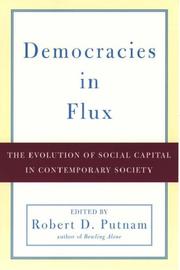| Listing 1 - 10 of 38 | << page >> |
Sort by
|
Book
ISBN: 9781476769899 9781476769912 1476769893 Year: 2015 Publisher: New York, N.Y. Simon & Schuster
Abstract | Keywords | Export | Availability | Bookmark
 Loading...
Loading...Choose an application
- Reference Manager
- EndNote
- RefWorks (Direct export to RefWorks)
"The bestselling author of Bowling Alone offers [an] ... examination of the American Dream in crisis--how and why opportunities for upward mobility are diminishing, jeopardizing the prospects of an ever larger segment of Americans"-- "What has happened to the Land of Opportunity? The promise of the American Dream is that anyone, regardless of his or her origins, can have a fair start in life. If we work hard, we can get a good education and achieve success. But over the last several decades a disturbing 'opportunity gap' has unexpectedly emerged between kids from 'have' and 'have-not' backgrounds. The central tenet of the American Dream--that all children, regardless of their family and social background, should have a decent chance to improve their lot in life--is no longer 'self-evident.' Robert Putnam begins this groundbreaking examination of our national prospects with the story of his high school class of 1959 in Port Clinton, Ohio. The vast majority of those students--'our kids' to everyone in town--went on to lives better than those of their parents. They raised their children with the same expectations. But those children--and their children--have not fared so well in an age of fragile families, crumbling communities, and disappearing jobs. Their lives reflect the diminishing opportunities that haunt so many American kids today. Putnam tells poignant stories of rich and poor kids from cities and suburbs across the country, drawing on a formidable body of research undertaken especially for this book. Our Kids is a rare combination of moving personal narratives and authoritative evidence--and for that reason, all the more troubling to read. It is a signal contribution to the ongoing discussion about inequality in America, a deeply informed and perceptive analysis of our country at a critical time. In the final chapter, Putnam offers suggestions for how we might halt this decline in opportunity and restore a greater chance for upward mobility."--Book jacket.
Social stratification --- United States --- American Dream --- Amerikaanse Droom --- Rève américain --- Social mobility --- Social classes --- Equality --- American Dream. --- #SBIB:316.356.2H1134 --- 316.344.2 --- Idealism, American --- Materialism --- Success --- Hedendaagse gezinsstudies: Noord-Amerika --- Socio-economische groepen --- Social conditions. --- Economic conditions. --- Social rörlighet --- Ekonomiska förhållanden --- Sociala förhållanden --- Jämställdhet --- Amerikanska drömmen --- Förenta staterna --- Social rörlighet. --- Ekonomiska förhållanden. --- Sociala förhållanden. --- Jämställdhet. --- Amerikanska drömmen. --- Equality. --- Social mobility. --- 316.344.2 Socio-economische groepen --- Förenta staterna. --- Social conditions --- Economic conditions --- United States of America

ISBN: 0131541951 Year: 1976 Publisher: Englewood Cliffs, N.J. Prentice-Hall
Abstract | Keywords | Export | Availability | Bookmark
 Loading...
Loading...Choose an application
- Reference Manager
- EndNote
- RefWorks (Direct export to RefWorks)
Politics --- Elite (Social sciences) --- Power (Social sciences) --- Elite (Sciences sociales) --- Pouvoir (Sciences sociales) --- 32 -057.17 --- #SBIB:324H41 --- politique --- Empowerment (Social sciences) --- Political power --- Exchange theory (Sociology) --- Political science --- Social sciences --- Sociology --- Consensus (Social sciences) --- Elites (Social sciences) --- Leadership --- Social classes --- Social groups --- Elite. Invloedrijke personen. Leiders. Leiderschap. Politieke elite. Sociale beinvloeding --- Politieke structuren: elite --- politiek --- 32 -057.17 Elite. Invloedrijke personen. Leiders. Leiderschap. Politieke elite. Sociale beinvloeding --- Elite (Social sciences). --- Power (Social sciences).
Book
ISBN: 0300014988 9780300014983 Year: 1973 Volume: 24 Publisher: New Haven, Conn. Yale University Press
Abstract | Keywords | Export | Availability | Bookmark
 Loading...
Loading...Choose an application
- Reference Manager
- EndNote
- RefWorks (Direct export to RefWorks)
Politics --- Italy --- Great Britain --- Elite (Social sciences) --- Ideology --- Social conflict --- Democracy --- Legislators --- 328 <41> --- 328 <45> --- #SBIB:328H214 --- #SBIB:328H2151 --- Lawmakers --- Legislatures, Members of --- Members of legislatures --- Members of parliaments --- Parliaments, Members of --- Statesmen --- Self-government --- Political science --- Equality --- Representative government and representation --- Republics --- Class conflict --- Class struggle --- Conflict, Social --- Social tensions --- Interpersonal conflict --- Social psychology --- Sociology --- Knowledge, Theory of --- Philosophy --- Psychology --- Thought and thinking --- Elites (Social sciences) --- Leadership --- Power (Social sciences) --- Social classes --- Social groups --- Parlement. Volksvertegenwoordiging. Regering en parlement--Verenigd Koninkrijk van Groot-Brittannië en Noord-Ierland --- Parlement. Volksvertegenwoordiging. Regering en parlement--Italië --- Instellingen en beleid: Verenigd Koninkrijk --- Instellingen en beleid: Italië --- 328 <45> Parlement. Volksvertegenwoordiging. Regering en parlement--Italië --- 328 <41> Parlement. Volksvertegenwoordiging. Regering en parlement--Verenigd Koninkrijk van Groot-Brittannië en Noord-Ierland --- Legislators - Great Britain --- Legislators - Italy

ISBN: 0743203046 9780743203043 0684832836 9780684832838 Year: 2000 Publisher: New York, N.Y. Simon & Schuster
Abstract | Keywords | Export | Availability | Bookmark
 Loading...
Loading...Choose an application
- Reference Manager
- EndNote
- RefWorks (Direct export to RefWorks)
Drawing on evidence that includes nearly half a million interviews conducted over 25 years in the US, Putnam shows how changes in work, family structure, suburban life, technology, and the roles of women are isolating people from each other in a trend that has its reflection in British society.
United States --- Social conditions --- Social change --- History --- Social capital (Sociology) --- Changement social --- Histoire --- Etats-Unis --- Conditions sociales --- 20th century --- 1945 --- -Social change --- 316.3 <73> --- 306.0973 --- 316.42 --- Ontwikkelingssociologie --- Samenleving --- Sociale veranderingen --- #ECO:01.01:economie algemeen --- #ECO:01.13:economie sociaal duurzaam milieu ethiek --- #ECO:05.04:landen VSA Canada --- individualisering --- sociale processen --- sociologie --- VSA --- am-vs 942.9 --- economische geschiedenis --- geschiedenis --- sociaal kapitaal --- sociale geschiedenis --- Verenigde Staten --- #SBIB:324H50 --- #SBIB:324H60 --- #SBIB:324H74 --- #KVHA:Geschiedenis; Verenigde Staten --- #KVHA:Verenigde Staten --- #VCV naslagwerk 2001 --- 308 <73> --- 651 Maatschappij. Algemeen --- #A0103A --- 316.42 Social change. Sociale ontwikkeling. Sociale veranderingen. Modernisering. Evolutie .Sociale revolutie. Modernisme --- Social change. Sociale ontwikkeling. Sociale veranderingen. Modernisering. Evolutie .Sociale revolutie. Modernisme --- 308 <73> Sociografie. Sociaal economische geografie. Sociale toestand--Verenigde Staten van Amerika. VSA. USA --- Sociografie. Sociaal economische geografie. Sociale toestand--Verenigde Staten van Amerika. VSA. USA --- 301.17 --- 301 --- 407 --- economische en sociale geschiedenis Verenigde Staten - bijzondere onderwerpen --- Politieke participatie en legitimiteit (referenda, directe democratie, publieke opinie...) --- Politieke socialisatie --- Politieke verandering: sociale bewegingen --- Sociologie --- Maatschappelijke ontwikkelingen --- Trends --- Cultuursociologie --- Noord-Amerika --- -Sociologie --- Maatschappelijke ontwikkeling --- Trend --- Erfelijkheidsleer --- Stadssamenleving --- Verpleegkunde --- Social change - United States - History - 20th century --- United States - Social conditions - 1945 --- -Social change - United States - History - 20th century --- Social change - United States - Statistics --- Social capital (Sociology) - United States --- United States of America --- Capital social (sociologie) --- États-Unis --- Culture populaire --- Groupes sociaux et communautés --- 20e siècle --- statistiques --- 1945-.... --- situation sociale --- étude culturelles

ISBN: 0195171608 0195150899 1280482249 9786610482245 0198034377 0195184602 0199882207 Year: 2002 Publisher: Oxford ; New York : Oxford University Press,
Abstract | Keywords | Export | Availability | Bookmark
 Loading...
Loading...Choose an application
- Reference Manager
- EndNote
- RefWorks (Direct export to RefWorks)
In Democracies in Flux, Putnam and nine world renowned scholars investigate the condition of social capital in eight advanced democratic nations.
SWEDEN -- 330.14 --- FRANCE -- 330.14 --- AUSTRALIA -- 330.14 --- JAPAN -- 330.14 --- CIVILIZATION -- 330.14 --- US -- 330.14 --- Civil society --- Democracy --- Social capital (Sociology) --- #SBIB:17H20 --- #SBIB:324H50 --- #SBIB:324H60 --- Capital, Social (Sociology) --- Sociology --- Self-government --- Political science --- Equality --- Representative government and representation --- Republics --- Social contract --- Sociale wijsbegeerte: algemeen --- Politieke participatie en legitimiteit (referenda, directe democratie, publieke opinie...) --- Politieke socialisatie --- Civil society. --- Democracy. --- Capital social (Sociologie) --- Société civile --- Démocratie --- Démocratie --- Société civile --- Capital social
Digital
Year: 2007
Abstract | Keywords | Export | Availability | Bookmark
 Loading...
Loading...Choose an application
- Reference Manager
- EndNote
- RefWorks (Direct export to RefWorks)
Dit artikel bevat de lezing van Harvard professor Robert Putnam bij de acceptatie van de Skytte-prijs voor politieke wetenschappen van de Zweedse universiteit van Uppsala. Putnam bespreekt de effecten van immigratie en etnische diversiteit op het sociaal kapitaal van een gemeenschap. Met 'sociaal kapitaal' bedoelt Putnam de rijkdom aan sociale netwerken van een gemeenschap en het bijhorende niveau van wederkerigheid en vertrouwen. De etnische diversiteit zal in vrijwel alle moderne samenlevingen sterk toenemen in de komende decennia. Onderzoek van Putnam wijst uit dat immigratie en etnische diversiteit op korte tot middellange termijn het sociaal kapitaal van een samenleving verkleinen en dus een negatieve invloed hebben: mensen in etnisch diverse buurten kruipen in hun schelp en zijn minder sociaal actief. Op middellange tot lange termijn echter kunnen succesvolle immigratiesamenlevingen nieuwe vormen van sociale solidariteit en een nieuw gevoel van identiteit creëren die de negatieve effecten van diversiteit opheffen. De auteur sluit af met enkele beleidsaanbevelingen.

ISBN: 9781428824584 Year: 2007 Publisher: S.l. Academic Internet Publishers
Abstract | Keywords | Export | Availability | Bookmark
 Loading...
Loading...Choose an application
- Reference Manager
- EndNote
- RefWorks (Direct export to RefWorks)
Book
ISBN: 3892048401 Year: 2001 Publisher: Gütersloh Bertelsmann
Abstract | Keywords | Export | Availability | Bookmark
 Loading...
Loading...Choose an application
- Reference Manager
- EndNote
- RefWorks (Direct export to RefWorks)
Communities --- Social groups --- Societies
Book
ISBN: 9780743203046 Year: 2000 Publisher: New York Simon & Schuster
Abstract | Keywords | Export | Availability | Bookmark
 Loading...
Loading...Choose an application
- Reference Manager
- EndNote
- RefWorks (Direct export to RefWorks)
In zijn boek maakt de auteur drie bewegingen. Eerst introduceert hij het begrip sociaal kapitaal als een belangrijk aspect van de kwaliteit van onze samenleving. Het gaat daarbij om elementen zoals sociale netwerken, betrokkenheid op elkaar en de samenleving, normen en vertrouwen. Meestal wordt nog onderscheid gemaakt in drie soorten sociaal kapitaal: 'Bonding social capital' of het behoren tot een groep, het hebben van sociale contacten, 'Bridging social capital' of het hebben van sociale contacten met andere groepen, bv. tussen allochtonen en autochtonen, en 'Linking social capital' of het meedoen aan de samenleving, participatie. Vervolgens geeft hij aan dat sociaal kapitaal belangrijk is, niet alleen als doel op zich, maar ook omdat het bijdraagt aan meer veiligheid, een betere gezondheid en meer zorgzaamheid. Tenslotte brengt hij een heleboel ontwikkelingen in beeld waaruit moet blijken dat sociaal kapitaal al enkele decennia in verval is. Het gaat dan om dalend lidmaatschap van vakbonden of kerken, dalende opkomst bij verkiezingen en het steeds meer alleen sporten in de plaats van het behoren bij een sportclub. Vandaar ook de titel. De individualisering van bowling staat daarin symbool voor algemene individualisering. De erosie van sociaal kapitaal is reden om ons zorgen te maken, en snel te investeren in het opnieuw opbouwen van dat verloren gegaan sociaal kapitaal. De manier waarop dat kan gebeuren, en ook gebeurt, beschrijft Putnam trouwens enkele jaren later in zijn boek 'Better together'
Verenigde Staten --- Samenleving --- 20e eeuw --- Sociaal kapitaal --- Sociaal netwerk

ISBN: 0803981023 Year: 1987 Publisher: London : Sage,
Abstract | Keywords | Export | Availability | Bookmark
 Loading...
Loading...Choose an application
- Reference Manager
- EndNote
- RefWorks (Direct export to RefWorks)
| Listing 1 - 10 of 38 | << page >> |
Sort by
|

 Search
Search Feedback
Feedback About UniCat
About UniCat  Help
Help News
News